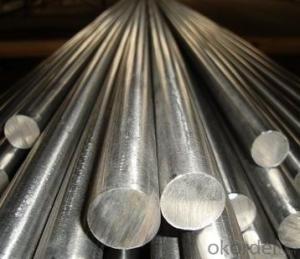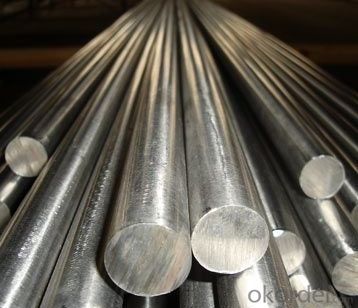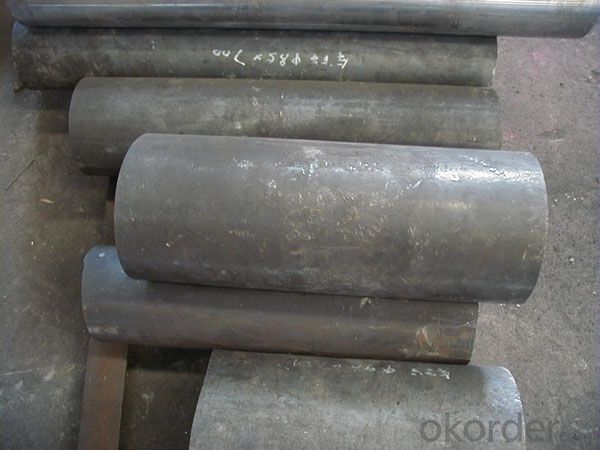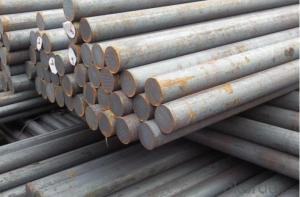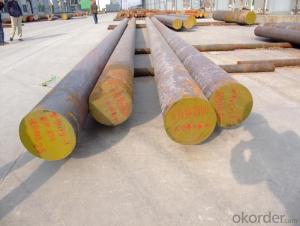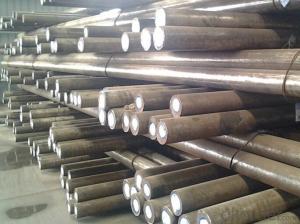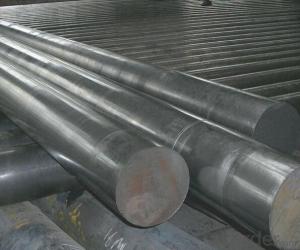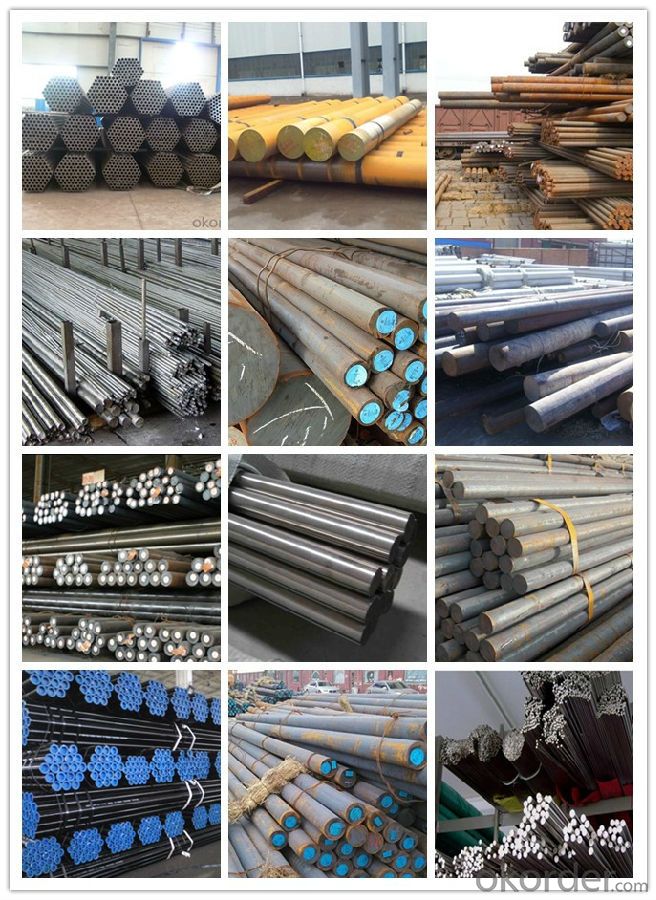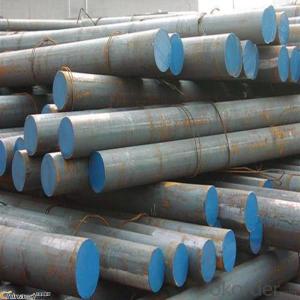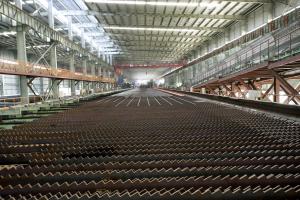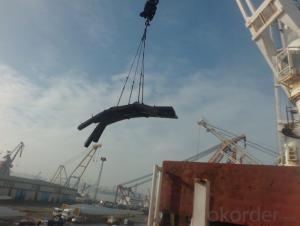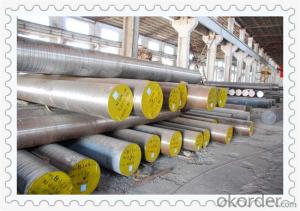Hot-Rolled 15CrMo Steel Round Bar Special Steel
- Loading Port:
- China main port
- Payment Terms:
- TT OR LC
- Min Order Qty:
- 30 m.t.
- Supply Capability:
- 10000 m.t./month
OKorder Service Pledge
OKorder Financial Service
You Might Also Like
Specification
Product Introduction
other material available | Carbon and alloy: Cr-Mo alloy, Cr-Ni alloy, Cr-Mn alloy, Si-Mn alloy |
Dia.: | 10mm~1200mm |
Length: | Random or fixed as required |
Standard | GB,ASTM,JIS,BS |
Out Side Coating | Bare outside |
Ends | Plain ends with color painting |
Packing | Loose bundle |
Delivery | By container/train/lorry |
Third Party Inspection | SGS/BV/LORDS |
Delivery time | 7 days Min. |
Product show
Workshop show
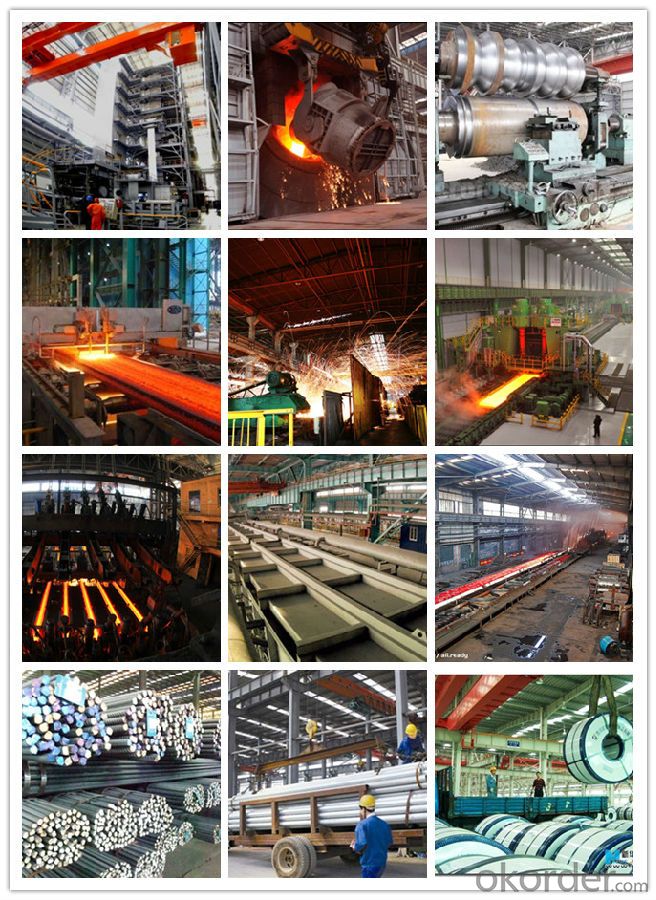
Shipping
1. FedEx/DHL/UPS/TNT for samples, Door-to-Door;
2. By Air or by Sea for batch goods, for FCL; Airport/ Port receiving;
3. Customers specifying freight forwarders or negotiable shipping methods!
Delivery Time: 3-7 days for samples; 5-25 days for batch goods.
Payment Terms
1.Payment: T/T, L/C, Western Union, MoneyGram,PayPal; 30% deposits; 70% balance before delivery.
2.MOQ: 1pcs
3.Warranty : 3 years
4.Package Informations: 1) EXPORT, In 20 feet (GW 25 ton) or 40 feet Container (GW 25 ton)
2)as customer's requirement
Why choose us?
(1) The leading exporter in China special steel industry.
(2) Large stocks for various sizes, fast delivery date.
(3) Good business relationship with China famous factories.
(4) More than 7 years steel exporting experience.
(5) Good after-sales service guarantee.
- Q: How is heat-resistant steel used in high-temperature applications?
- Heat-resistant steel is used in high-temperature applications due to its ability to withstand extreme heat without losing its structural integrity. It is commonly used in industries such as aerospace, automotive, power generation, and petrochemical, where components are exposed to high temperatures. This steel is used to manufacture parts like turbine blades, exhaust systems, heat exchangers, and furnaces, ensuring reliable performance and preventing premature failure at elevated temperatures.
- Q: How does special steel contribute to the energy storage sector?
- The energy storage sector heavily relies on special steel, which plays an indispensable role by supplying critical components for various energy storage systems. One notable application of special steel lies in the production of batteries, which are crucial for storing energy in diverse forms. Special steel possesses exceptional qualities that make it an ideal choice for battery casings and frames. Its high strength, excellent corrosion resistance, and durability enable battery casings made from special steel to endure high pressures and shield internal components from external impacts. As a result, the entire energy storage system is ensured of safety and reliability. Moreover, special steel finds utility in the creation of electrodes, a vital part of batteries. Electrodes necessitate materials with efficient electrical conductivity and endurance for repeated charging and discharging cycles. Special steel, such as stainless steel, possesses excellent electrical conductivity and can withstand the demanding conditions within batteries, making it an excellent option for electrode production. Additionally, special steel is integrated into the construction of energy storage system infrastructure. Steel structures are utilized to support large-scale energy storage devices, including pumped hydro storage facilities and compressed air energy storage systems. These structures must possess strength, durability, and resistance to environmental conditions. Special steel provides the necessary properties to ensure the longevity and reliability of these energy storage infrastructure projects. In conclusion, special steel significantly contributes to the energy storage sector by supplying vital components for batteries, such as casings and electrodes. It also plays a crucial role in the construction of energy storage system infrastructure. With its exceptional qualities, special steel enhances the safety, efficiency, and durability of energy storage technologies, thereby facilitating the growth and advancement of the renewable energy sector as a whole.
- Q: Can special steel be used in the manufacturing of firearms?
- Special steel is unquestionably applicable for firearm production. In truth, it is frequently favored for this purpose owing to its distinct properties that render it apt for enduring high temperatures, pressures, and stress. Firearms necessitate materials that possess strength, durability, and the capability to withstand the immense forces generated during firing. Special steel alloys, such as stainless steel or heat-treated steel, provide these desired traits and are extensively employed in fabricating firearm barrels, receivers, and other crucial constituents. The incorporation of special steel in firearm manufacturing guarantees the dependability, safety, and consistent performance of these weapons in diverse conditions.
- Q: How is stainless steel used in the production of kitchen utensils?
- Stainless steel is commonly used in the production of kitchen utensils due to its durability, corrosion resistance, and aesthetic appeal. It is used to make various utensils such as knives, forks, spoons, pots, pans, and cooking tools. The stainless steel material ensures that these utensils can withstand frequent use, resist rust and staining, and are easy to clean, making them ideal for use in the kitchen.
- Q: What are the requirements for special steel used in oil and gas equipment manufacturing?
- The requirements for special steel used in oil and gas equipment manufacturing include high strength and corrosion resistance to withstand harsh operating conditions, such as high pressure, temperature, and exposure to corrosive substances. It should also have excellent fatigue resistance and toughness to ensure long-term reliability. Additionally, the steel should be able to maintain its mechanical properties even at low temperatures and possess good weldability for ease of fabrication and assembly. Compliance with industry standards, such as API specifications, is also essential to ensure quality and compatibility with other components.
- Q: How does special steel perform in high-temperature creep?
- Special steel is specifically designed to perform well in high-temperature creep conditions. Creep refers to the tendency of a material to deform under constant stress over time at elevated temperatures. Special steel exhibits excellent resistance to creep due to its unique composition and heat treatment processes. The alloying elements used in special steel, such as chromium, nickel, and molybdenum, significantly enhance its high-temperature strength and creep resistance. These alloying elements form stable carbides and improve the material's ability to retain its structural integrity even at elevated temperatures. Furthermore, special steel is often subjected to specific heat treatment methods, such as annealing or quenching and tempering, to further enhance its creep resistance. These processes help in refining the microstructure of the steel, reducing the presence of internal stresses, and improving its overall mechanical properties. The combination of alloying elements and heat treatment processes in special steel provides it with exceptional creep resistance. It can withstand prolonged exposure to high temperatures without significant deformation or failure. This makes special steel an ideal choice for applications that involve high-temperature and high-stress conditions, such as gas turbines, petrochemical plants, and power generation facilities. Overall, the performance of special steel in high-temperature creep is outstanding, and it is widely recognized as a reliable and durable material for applications requiring resistance to thermal deformation and long-term stability under constant stress.
- Q: How is weathering steel used in outdoor structures?
- Weathering steel, also known as corten steel, is commonly used in outdoor structures due to its unique properties. It forms a protective rust-like surface when exposed to the elements, which acts as a natural barrier against further corrosion. This makes it highly resistant to rust and erosion, making it ideal for outdoor structures such as bridges, sculptures, architectural facades, and retaining walls. Additionally, weathering steel is aesthetically pleasing and requires minimal maintenance, making it a popular choice in various outdoor applications.
- Q: Can special steel be used in cryogenic applications?
- Yes, special steel can be used in cryogenic applications. Special steels, such as austenitic stainless steels like 304 or 316, are commonly used in cryogenic applications due to their excellent mechanical properties and resistance to low temperatures. These steels are able to maintain their strength, toughness, and ductility even at extremely low temperatures, making them suitable for use in cryogenic environments. Additionally, special steels can also exhibit good resistance to corrosion and thermal expansion, which are important factors to consider in cryogenic applications. Overall, special steel alloys are well-suited for use in cryogenic applications due to their unique combination of properties that enable them to withstand and perform in extremely cold conditions.
- Q: How does special steel resist wear and abrasion?
- Special steel resists wear and abrasion through various mechanisms such as the presence of alloying elements, heat treatment processes, and specialized surface coatings. Alloying elements like chromium, manganese, and vanadium enhance the steel's hardness, toughness, and resistance to wear. Heat treatment techniques, such as quenching and tempering, further improve the steel's microstructure, making it more resistant to wear and abrasion. Additionally, specialized surface coatings like chrome plating or nitriding can be applied to enhance the steel's surface hardness, reducing friction and preventing wear. Overall, the combination of alloying elements, heat treatment, and surface coatings significantly enhance the wear and abrasion resistance of special steel.
- Q: What are the different corrosion-resistant special steel alloys?
- There are several corrosion-resistant special steel alloys that are commonly used in various industries. Some of the most popular ones include stainless steel, duplex stainless steel, super duplex stainless steel, and nickel-based alloys. Stainless steel is a widely used corrosion-resistant alloy that contains a minimum of 10.5% chromium. It forms a protective layer of chromium oxide on its surface, preventing further corrosion. Stainless steel is highly resistant to rust, staining, and pitting, making it suitable for applications in the food processing, chemical, and marine industries. Duplex stainless steel is a combination of both austenitic and ferritic stainless steels. It offers excellent resistance to corrosion, particularly in environments with high chloride ion concentrations. Duplex stainless steel is commonly used in the oil and gas, chemical, and desalination industries. Super duplex stainless steel is a higher strength version of duplex stainless steel. It offers enhanced corrosion resistance and mechanical properties, making it ideal for applications in harsh environments such as offshore oil and gas platforms, chemical processing plants, and seawater desalination systems. Nickel-based alloys, such as Inconel and Hastelloy, are known for their exceptional resistance to corrosion and high-temperature environments. These alloys are commonly used in industries such as aerospace, chemical processing, and power generation, where resistance to both corrosion and heat is critical. These corrosion-resistant special steel alloys provide various options for industries that require materials with excellent durability and resistance to corrosive environments. The choice of alloy depends on the specific application, operating conditions, and desired performance characteristics.
Send your message to us
Hot-Rolled 15CrMo Steel Round Bar Special Steel
- Loading Port:
- China main port
- Payment Terms:
- TT OR LC
- Min Order Qty:
- 30 m.t.
- Supply Capability:
- 10000 m.t./month
OKorder Service Pledge
OKorder Financial Service
Similar products
Hot products
Hot Searches
Related keywords
